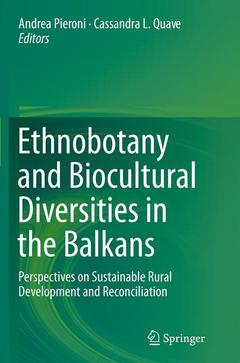Ethnobotany and Biocultural Diversities in the Balkans, Softcover reprint of the original 1st ed. 2014 Perspectives on Sustainable Rural Development and Reconciliation
Coordonnateurs : Pieroni Andrea, Quave Cassandra L.

This volume addresses recent and ongoing ethnobotanical studies in the Balkans. The book focuses on elaborating the relevance of such studies for future initiatives in this region, both in terms of sustainable and peaceful (trans-regional, trans-cultural) rural development. A multi-disciplinary viewpoint is utilized, with an incorporation of historical, ethnographic, linguistic, biological, nutritional and medical perspectives. The book is also authored by recognized scholars, who in the last decade have extensively researched the Balkan traditional knowledge systems as they pertain to perceptions of the natural world and especially plants.
Ethnobotany and Biocultural Diversities in the Balkans is the first ethnobotany book on one of the most biologically and culturally diverse regions of the world and is a valuable resource for both scholars and students interested in the field of ethnobotany.
Chapter 1. Ethnobotany in the Balkans: Quo Vadis?
Andrea Pieroniand Cassandra L. Quave
Part I. From Folk Medicine to the Medicinal Plant Trade
Chapter 2. Ways the Lukomir Highlanders of Bosnia and Herzegovina Treat Diabetes
Jonathan Ferrier, Lana Šačiragić, Eric C.H. Chen, Sabina Trakić, Ammar Saleem, Emira Alikadić, Alain Cuerrier, Michael J. Balick, John T. Arnason, and Sulejman Redžić
Chapter 3. Hungarian Ethnobotanical Studies in Romania
Nóra Papp, Kata Birkás-Frendl, Ágnes Farkas, and Dóra Czégényi
Chapter 4. Bulgarian Medical Ethnobotany: The Power of Plants in Pragmatic and Poetic Frames
Anely Nedelchevaand Stefan Draganov
Chapter 5. Cross-Cultural Ethnobotany of the Sharr Mountains (North-Western Macedonia)
Besnik Rexhepi, Behxhet Mustafa, Avni Hajdari, Jehona Rushidi-Rexhepi,Cassandra L. Quave, and Andrea Pieroni
Chapter 6. An Ethnobotanical and Ethnomedicinal Study on the Use of Wild Medicinal Plants in Rural Areas of Serbia
Snežana Jarić, Miroslava Mitrović, and Pavle Pavlović
Chapter 7. Medical Ethnobotanical Studies in Kosovo
Behxhet Mustafa and Avni Hajdari
Part II. Balkan Traditional Plant-Based Foods: Beyond the Ottoman Cuisine
Chapter 8. Wild Food Plants of Dalmatia (Croatia)
Łukasz Łuczaj, Katija Dolina, Norma Fressel, and Stjepan Perković
Chapter 9. The Use of Wild Plants for Human Nutrition During a War: Eastern Bosnia (Western
Balkans)
Sulejman Redžić and Jonathan Ferrier
Chapter 10. Wild Food and Medicinal Plants Used in the Mountainous Albanian North, North-East, and East: A Comparison
Andrea Pieroni and Cassandra L. Quave
Part III. Building Small-scale, Environmentally and Socially Sustainable Economies
Chapter 11. Medicinal Plants in Northern Montenegro: Traditional Knowledge,
Quality, and Resources
Nebojša Menković, Katarina Šavikin, Gordana Zdunić, Slobodan Milosavljević, and Jelena
Živković
Chapter 12. Ethnobotanical Knowledge and Traditional Use of Plants in Serbia in Relation to
Sustainable Rural Development
Zora Dajić Stevanović, Milica Petrović, and Svetlana Aćić
Andrea Pieroni, PhD
University of Gastronomic Sciences, Pollenzo, Italy
Cassandra L. Quave, PhD
Emory University School of Medicine, Department of Dermatology and Center for the Study of Human Health, Atlanta, GA, USA
First ethnobotany book on one of the most biologically and culturally diverse regions of the world
First ethnobotany linked to concrete perspectives in terms of sustainable development
First ethnobotany book based upon a broad spectrum of approaches: historical, ethnographic, linguistic, biological, medical, and nutritional
Includes supplementary material: sn.pub/extras
Date de parution : 09-2016
Ouvrage de 255 p.
15.5x23.5 cm
Disponible chez l'éditeur (délai d'approvisionnement : 15 jours).
Prix indicatif 158,24 €
Ajouter au panierDate de parution : 11-2014
Ouvrage de 255 p.
15.5x23.5 cm
Disponible chez l'éditeur (délai d'approvisionnement : 15 jours).
Prix indicatif 158,24 €
Ajouter au panierThème d’Ethnobotany and Biocultural Diversities in the Balkans :
Mots-clés :
Balkans; Ethnobiology; Ethnobotany; Ethnomedicine; Systems Biology



